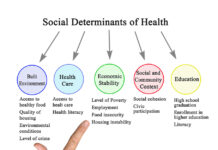Individuals with psychosocial disabilities have been advocating for their right to self-determination worldwide. In an effort to comprehend and highlight their experiences, Samuel Law and colleagues from the University of Toronto conducted a study on the lived experiences of adults with serious mental illness (SMI) who have substitute decision makers (SDM). The findings of the study were published in the Psychiatric Rehabilitation Journal.
According to the researchers:
“While the use of SDM is established on the ethical principle of beneficence, the attendant loss of autonomy is often underlined. In the context of the United Nations Convention on the Rights of Persons with Disability, which highlights dignity, human rights, and a loss of self-determination as chief reasons that many common practices such as civil commitment, outpatient treatment orders, and substitute decision making, among others, need to be abolished, and the SDM system should be replaced by a more person-centered approach using supported decision making – the practice of SDM is under scrutiny.”
“While the general principles and ideals of the Convention have been ratified by most countries globally, many United States (which has not ratified the CRPD to date) have voiced concerns and allowed the continued use of substitute decision making, particularly in the context of people with SMI.”
 As the disability rights movement has increased awareness about coercive psychiatric power, the United Nations has made policy changes to eliminate coercion in mental health settings. Various nations have also attempted these changes in policy, including Canada, Peru, and the European Union.
As the disability rights movement has increased awareness about coercive psychiatric power, the United Nations has made policy changes to eliminate coercion in mental health settings. Various nations have also attempted these changes in policy, including Canada, Peru, and the European Union.
These modifications aim to safeguard the human rights of individuals with disabilities by preserving their ability to make decisions and act on their own behalf. While there has been progress in public discussions on this topic, policy changes and legal rights have yet to catch up.
To better understand the lives of people who are diagnosed with SMI and who have an SDM, limiting their agency and human rights, the researchers sought to study their lived experiences.
Eleven participants who were over 18 years old, diagnosed with schizophrenia or bipolar disorder, spoke adequate English and could provide consent were interviewed. They all currently had SDMs, and their SDMs were mothers, fathers, husbands, brothers, uncles, or public guardians and trustees. The participants comprised seven males and four females; seven identified as white, three as black, and one as mixed race. Most of them were between the ages of 35-50. During the interviews, the researchers asked open-ended questions and elicited examples regarding their experiences as people diagnosed with SMI (Serious Mental Illness) and having an SDM. The interviews lasted between 30-90 minutes and were transcribed. The researchers then analyzed the transcriptions through thematic analysis, which involved writing analytic memos iteratively to capture the significant issues.
As a result of their thematic analysis, the researchers developed five (5) themes:
Strong dissatisfaction with and rejection of the SDM’s role and purpose:
Most participants talked about their discontent with having an SDM make treatment-related decisions for them, which at times involved being hospitalized involuntarily, opposing their treatments, rejecting their mental diagnoses and labels, and concerns about being perceived as abnormal. Through this theme, the researchers also highlighted how participants often felt normal and disagreed with the need for an SDM during those times.
A pervasive sense of stigma associated with having SDM:
Some participants also talked about how they experienced stigma due to their diagnosis and having an SDM, which led to a sense of shame and incapacity.
Ongoing struggles to gain autonomy:
Most participants also talked about how they grieved their agency, autonomy, and personal identity, feeling powerless and hopeless about changing their circumstances and finding scarce resources. They also mentioned understanding they might have needed their SDM at a particular time; it is not a recurring need, and thus, their agency should not be consistently limited.
Mixed changes in relationship with and views about SDM:
Participants talked about feeling as though their “SDM was not on their side,” which created stress and changed their relationship with the SDM, as many felt as though they could no longer trust their SDM. Although most participants mentioned negative changes in their relationship with their SDM, others said their relationship improved.
Views on how to improve SDM processes:
Participants provided various suggestions about how to change the SDM process, including having the SDM see them as a full person, improved transparency and communication, enhanced trust between them and the SDM, having a chance to regain control of their autonomy, having the capacity to choose their SDM, and having the capacity remove the SDM “as the middle person.”
The results of this study add to the growing literature on the experiences of people who experience SMIs, have SDMs, and have lived through involuntary treatment or hospitalization. Moreover, the participants’ suggestions on how to change the SDM process support the United Nations Convention on the Rights of Persons with Disabilities suggested policy changes, in which substitute decision-makers are replaced with supported decision-making, which secures the ongoing agency and human rights of people with disabilities.
****
Law, S., Stergiopoulos, V., Zaheer, J., & Nakhost, A. (2023). “It feels terrible that people are making decisions for me”: Reflections and experiences of individuals with a psychiatric disability who have substitute decision-makers for treatment. Psychiatric Rehabilitation Journal. Advanced online publication. https://doi.org/10.1037/prj0000592 (Link)














